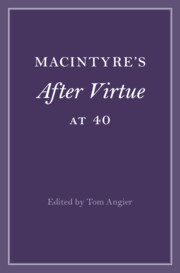Book contents
- MacIntyre’s After Virtue at 40
- Cambridge Philosophical Anniversaries
- MacIntyre’s After Virtue at 40
- Copyright page
- Contents
- Contributors
- Introduction
- Part I After Virtue and Ethical Theory
- Part II After Virtue and Political Theory
- Part III After Virtue and Narrative
- 8 Form, Style and Voice in After Virtue
- 9 After Virtue, Narrative and the Human Good
- 10 After Virtue as a Narrative of Revolutionary Practical Reason
- Part IV After Virtue beyond Philosophy
- Bibliography
- Index
10 - After Virtue as a Narrative of Revolutionary Practical Reason
from Part III - After Virtue and Narrative
Published online by Cambridge University Press: 12 October 2023
- MacIntyre’s After Virtue at 40
- Cambridge Philosophical Anniversaries
- MacIntyre’s After Virtue at 40
- Copyright page
- Contents
- Contributors
- Introduction
- Part I After Virtue and Ethical Theory
- Part II After Virtue and Political Theory
- Part III After Virtue and Narrative
- 8 Form, Style and Voice in After Virtue
- 9 After Virtue, Narrative and the Human Good
- 10 After Virtue as a Narrative of Revolutionary Practical Reason
- Part IV After Virtue beyond Philosophy
- Bibliography
- Index
Summary
Two themes unite seventy years of Alasdair MacIntyre’s writings in ethics and politics: the rejection of modern normative theories and the pursuit of practical reasoning. While conventional moral philosophers and their critics fight over which normative theory provides the true criterion of morality or whether philosophy can guide morals at all, MacIntyre takes a different course. MacIntyre’s account of practical reasoning answers an Aristotelian question: how can we become the kind of people who recognise what is good and best for us to do and who exercise the moral freedom to act on that judgement? MacIntyre finds that communities discover the practical demands of life together through the narratives they have created to make sense of practices, whole human lives and traditions. Conventional scholars may expect to find a normative theory in MacIntyre’s work, but local narratives about choosing well, not abstract theories about duties and obligations, play the central role in his ethics and politics. For MacIntyre, modern normative theories are merely one kind of narrative, one that distorts practical reasoning by separating morality from human desire. This chapter will examine the critical argument of After Virtue (chapters 1–9) in the broader context of MacIntyre’s background and writings in order to illuminate the conditions it imposes on any constructive effort in moral philosophy and to show how MacIntyre’s narrative of revolutionary practical reason (chapters 10–18) meets those conditions by uniting morality and desire.
- Type
- Chapter
- Information
- MacIntyre's After Virtue at 40 , pp. 179 - 198Publisher: Cambridge University PressPrint publication year: 2023



